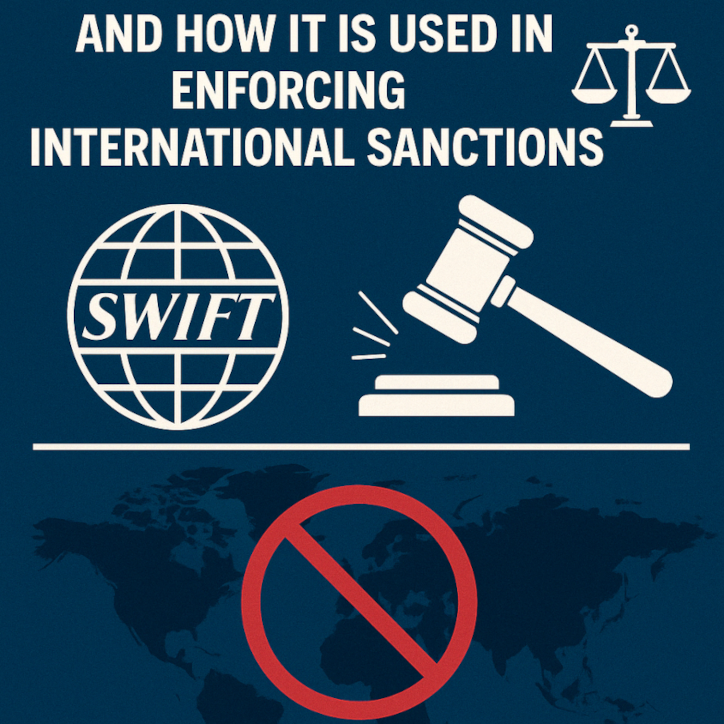
In global finance, SWIFT (Society for Worldwide Interbank Financial Telecommunication) stands as the dominant messaging platform for the secure exchange of financial information between banks and other financial institutions. Beyond its technical role in facilitating transactions, SWIFT has become an instrument of strategic influence. particularly in the realm of international sanctions enforcement.
This article explores who governs SWIFT, how its operations intersect with geopolitical power, and the ways it is utilised to implement global sanctions regimes.
SWIFT is a member-owned cooperative headquartered in La Hulpe, Belgium, and is legally structured under Belgian law. It is not a bank and does not hold or transfer funds. Instead, it serves as a neutral and standardised messaging system that enables banks and financial institutions to transmit payment instructions and trade finance messages.
The organisation is governed by a Board of Directors representing member banks across various countries and is subject to oversight by the central banks of the G10 nations, including:
Belgium (host country and lead overseer)
Canada
France
Germany
Italy
Japan
Netherlands
Sweden
Switzerland
United Kingdom
United States
The National Bank of Belgium leads the oversight in cooperation with the European Central Bank (ECB) and other G10 central banks, as part of the SWIFT Oversight Forum. The oversight ensures that SWIFT operations are secure, resilient, and compliant with international standards of transparency and systemic stability.
While SWIFT itself maintains a position of political neutrality, the platform’s critical importance to the global banking system makes access to it a powerful geopolitical lever. Access to SWIFT is essential for international settlements, and being disconnected from it has significant consequences.
Suspension or Removal of SWIFT Access
Governments or international bodies such as the European Union, the United States, or the United Nations Security Council may impose sanctions that target specific institutions or entire jurisdictions. While SWIFT is not a sanctions enforcement body, it has historically complied with EU regulations (due to its legal domicile in Belgium) and responded to political directives by disconnecting sanctioned banks.
Blocking of Specific Institutions
Banks subject to sanctions, such as those in Iran, North Korea, or Russia, may be excluded from the SWIFT network. This effectively severs their access to global payment systems, making it nearly impossible to settle cross-border trades or conduct international banking.
Restricting Transaction Types
Even where full disconnection is not implemented, targeted institutions may face restrictions on the types of SWIFT messages they can send, limiting activities such as trade finance, securities settlement, or foreign currency transfers.
In 2012, under pressure from the EU Council Regulation 267/2012, SWIFT disconnected a number of Iranian banks from its system due to concerns over nuclear proliferation. The action was a significant financial blow to Iran, as it curtailed the ability of its banks to facilitate oil sales and trade. A similar action occurred in 2018 following the U.S. withdrawal from the JCPOA, with further disconnections initiated.
In response to Russia’s invasion of Ukraine, a coalition of Western nations initiated sanctions that included banning several major Russian banks from SWIFT, including Sberbank and VTB Bank. This was a coordinated act between the EU, UK, U.S., and Canada, and served to isolate Russia from the global financial system, disrupt its export trade, and freeze its foreign currency reserves.
Although SWIFT claims to be politically neutral, its compliance with EU laws and international regulations means it can be legally obligated to implement certain measures. Its cooperation with sanctions regimes is not voluntary when imposed by binding legislation in its jurisdiction.
However, the politicisation of SWIFT has raised concerns in the global South and among non-Western powers, some of which are now exploring or building alternative systems such as:
China’s CIPS (Cross-Border Interbank Payment System)
Russia’s SPFS (System for Transfer of Financial Messages)
India’s SFMS (Structured Financial Messaging System)
These initiatives signal a shift toward multipolar financial infrastructure in response to perceived overreach by Western-led institutions.
It is an essential pillar of international finance whose access, or denial, can have profound economic and political implications. While its core mission is to provide secure, standardised communication for financial institutions, SWIFT’s role in sanctions enforcement has evolved into a tool of economic statecraft.
For financial institutions, exporters, and importers operating in sensitive jurisdictions, understanding SWIFT’s structure, governance, and compliance obligations is critical to mitigating geopolitical risk.
We use cookies to give you the best online experience. By agreeing you accept the use of cookies in accordance with our cookie policy.